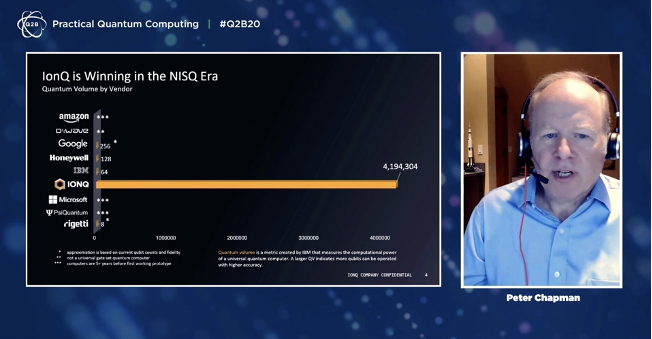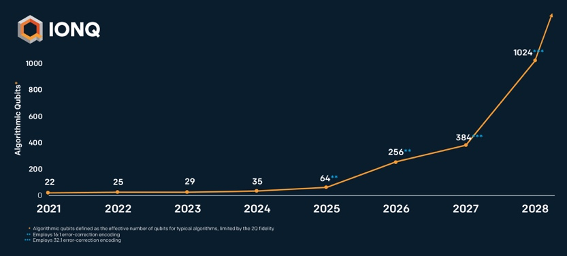@ionq latest announcement with their roadmap is out: https://techcrunch.com/2020/12/09/ionq-plans-to-launch-a-rack-mounted-quantum-computer-for-data-centers-in-2023/. Also check Peter Chapman talk on Q2B 2020 for similar content. The thread below hopefully will foster more discussion by the community. Disclaimer: all I write reflects only my personal opinion 1/20
IonQ claims to have today 22 qubits, all-to-all coupling, and 2-qubit error rates of 0.4% (achieving quantum volume of 4 millions). It’s a big improvement over their latest published result of 11 qubits with 2.5% error rate ( https://www.nature.com/articles/s41467-019-13534-2). 2/20
In their previous PR on October 2020, Chapman also said: "In a single generation of hardware, we went from 11 to 32 qubits, and more importantly, improved the fidelity required to use all 32 qubits,". I look forward seeing data on the experiments, which is not available yet. 3/20
Here's a plot of their roadmap. “Algorithmic qubits” in their plot means log_2(q. vol). By 2028, depth 1014 circuits on 1014 qubits. That would be amazing progress, but does it get us to useful applications of quantum computing? 4/20
Chapman says: “As soon as you hit about 40 algorithmic qubits (...), you’ll start to see quantum advantage probably in machine learning”. Unlikely! QML is far into the future if ever. Also one can still easily simulate circuits on 40 qubits classically. 5/20
Chapman also says: “And then, I think it’s pretty well accepted that at 72 qubits is roughly when you start to do quantum advantage fairly broadly”. Not true! There are a few known applications for qubit counts close to 72, but one needs circuits of depth >>100k for that. 6/20
With 72 “algorithm qubits” we can only run circuits of depth 72. You might hope for early advantage with variational/hybrid methods, but that’s just a hope from today's facts. Depth 72 seems pretty small even assuming variational methods will eventually work. 7/20
He continues: “So that would be in 2025. When you start to get into 2027, you’re now getting into hundreds of qubits if not early 1000s of qubits in [2028]. And now you’re starting to get into full-scale fault tolerance”. 8/20
Depth-1000 circuits on 1000 qubits would be awesome progress, but far from what we believe is required for applications and what full-scale fault-tolerance would give. Ultimately we want a good number of qubits that we can run very, very!, long circuits on. 9/20
@ionq plans to get 64 “alg. qubits” using 16 physical qubits to encode 1 logical qubit. I assume they plan to use Bacon-Shor codes, building on the beautiful recent paper ( https://arxiv.org/abs/2009.11482 ). But details of their scheme for FT computation are not available yet. 10/20
@ionq says: “other technologies, because of their poor gate fidelity and qubit connectivity, might need 1,000, 10,000 or even 1,000,000 qubits to create a single error-corrected qubit.” 11/20
100-1,000 overhead is the estimated number required to get very small error rates (< 10^-10), capable of running useful algorithms. 12/20
Ions are not different! If their physical 2-qubit error rate is >0.1%, they will also require similar overheads. Right now, with @ionq current 2-qubit error rates of >1.5%, error correction is not possible even with unbounded overhead. 13/20
“IonQ has long argued that scaling its technology doesn’t necessitate any technological breakthroughs”. To scale >30 qubits, @ionq plans to use optical interconnects between different ions traps. That is an old idea, but has shown to be very challenging to get it right. 14/20
Seems IonQ is giving itself 5 years to figure it out. Experts have been trying to do it for at least 10 years. While I hope IonQ will pull it off in the fullness of time, functional optical interconnects are a major tech breakthrough required for ions scalability. 15/20
It would be great if IonQ was upfront about it and reported on their progress towards optical interconnects. If anyone can do it, I believe it's them! 16/20
I have deep respect for IonQ scientists and I think they have the right to be excited about their approach as much as anyone else. It’s still early days for everyone and all different platforms have to circumvent major technical challenges for scalability. 17/20
But I question if the over-the-top, never-ending, PR campaign of the company in recent years is the right approach to give value to its customers and help the world realize the dream of scalable quantum computers. 18/20
To all our community (and unrelated to my comments on IonQ): we should be very grateful of all the investment our field is getting. But we have the responsibility of keeping hype down. 19/20
The focus must be on tech and science development, not on vanity and greed. We owe it to the future generations of quantum scientists, investors and end-users. 20/20

 Read on Twitter
Read on Twitter



